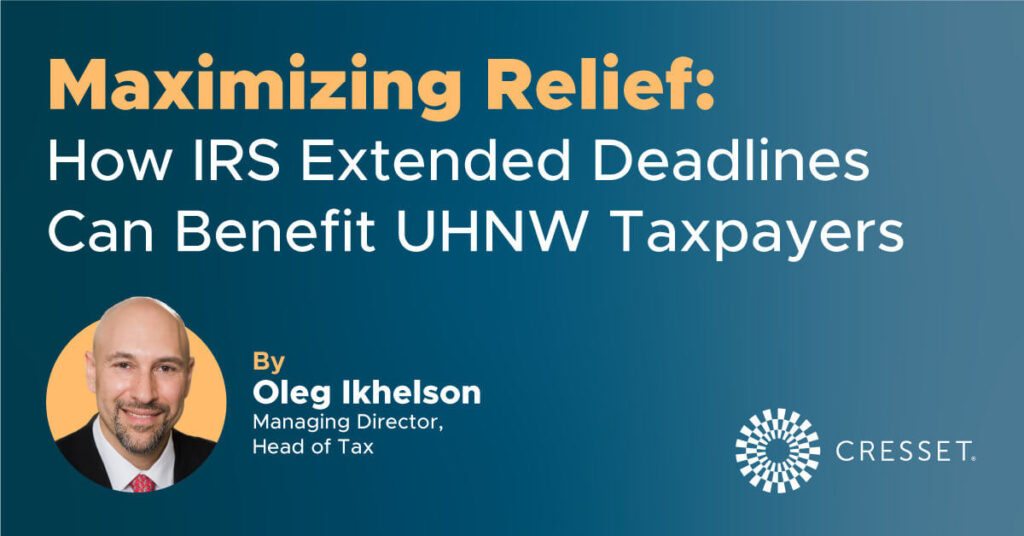
By Oleg Ikhelson, Managing Director, Head of Tax
In light of a particularly destructive hurricane season, the IRS has extended several tax deadlines for residents in affected states, offering a unique opportunity for ultra-high-net-worth (UHNW) individuals to capitalize on this situation. These relief measures aim to alleviate the financial burden on those impacted by the hurricanes, while also providing a strategic opportunity to manage tax liabilities more effectively. By utilizing this extension, UHNW individuals can optimize their financial planning, preserve capital, and leverage investment opportunities during a challenging economic climate.
Extended Deadlines At-A-Glance
- October 15, 2024: The deadline for filing 2023 tax returns has been extended to May 1, 2025.
- January 15, 2025: The deadline for the last quarterly estimated tax payment for tax year 2024 has been extended to May 1, 2025.
- March 15, 2025: The deadline for many business tax returns has been extended to May 1, 2025.
- April 15, 2025: The deadline for individuals and businesses to file 2024 federal tax returns (or file a six-month extension) and make tax payments has been extended to May 1, 2025.
Financial Implications
The IRS tax extension offers significant financial benefits for affected taxpayers, creating opportunities to improve their short-term financial position.
- Interest Earnings: The extension on payments allows taxpayers to keep their funds longer, potentially earning additional interest during that period. This gives individuals and businesses a chance to maximize the return on money that would have otherwise been paid to the IRS sooner. For ultra-high-net-worth individuals with substantial tax liabilities, the opportunity to hold onto significant sums for an extended period can be especially beneficial, potentially resulting in notable gains through interest or investment returns.
- Cash Flow Management: By postponing fourth-quarter estimated tax payments, taxpayers can better manage their cash flow during the recovery period. This extension provides added flexibility, helping individuals and businesses prioritize their financial needs as they rebuild after the hurricane.
- Eliminate the Guessing Game: Historically, UHNW individuals face challenges with fourth-quarter tax payments due on January 15, as many tax forms are not yet available. This deadline is often the final chance for taxpayers to “true up” their income expectations and avoid underpayment penalties. However, the hurricane extension provides an additional three and a half months, by which time most K-1 and 1099 forms will have been issued, making it significantly easier to determine the actual Q4 2024 IRS liability.
Extensive Coverage Across Affected States
The IRS relief applies to a broad range of counties in affected states. It is important for taxpayers to verify whether their region is included in the extension. The IRS has provided a detailed list of the covered counties. Notably:
- The entire state of Florida is eligible for relief
- The entire states of Alabama, Georgia, North Carolina, and South Carolina are eligible for relief
Taxpayers should consult with tax professionals to fully understand how these extensions apply to their specific situations and to maximize the financial benefits of this relief program.
Contact Cresset to learn how to effectively optimize the IRS’s extended deadlines.
About Cresset
Cresset is an independent, award-winning multi-family office and private investment firm with more than $235 billion in assets under management and advisement (as of 10/31/2025). Cresset serves the unique needs of entrepreneurs, CEO founders, wealth creators, executives, and partners, as well as high-net-worth and multi-generational families. Our goal is to deliver a new paradigm for wealth management, giving you time to pursue what matters to you most.
https://cressetcapital.com/disclosures/
